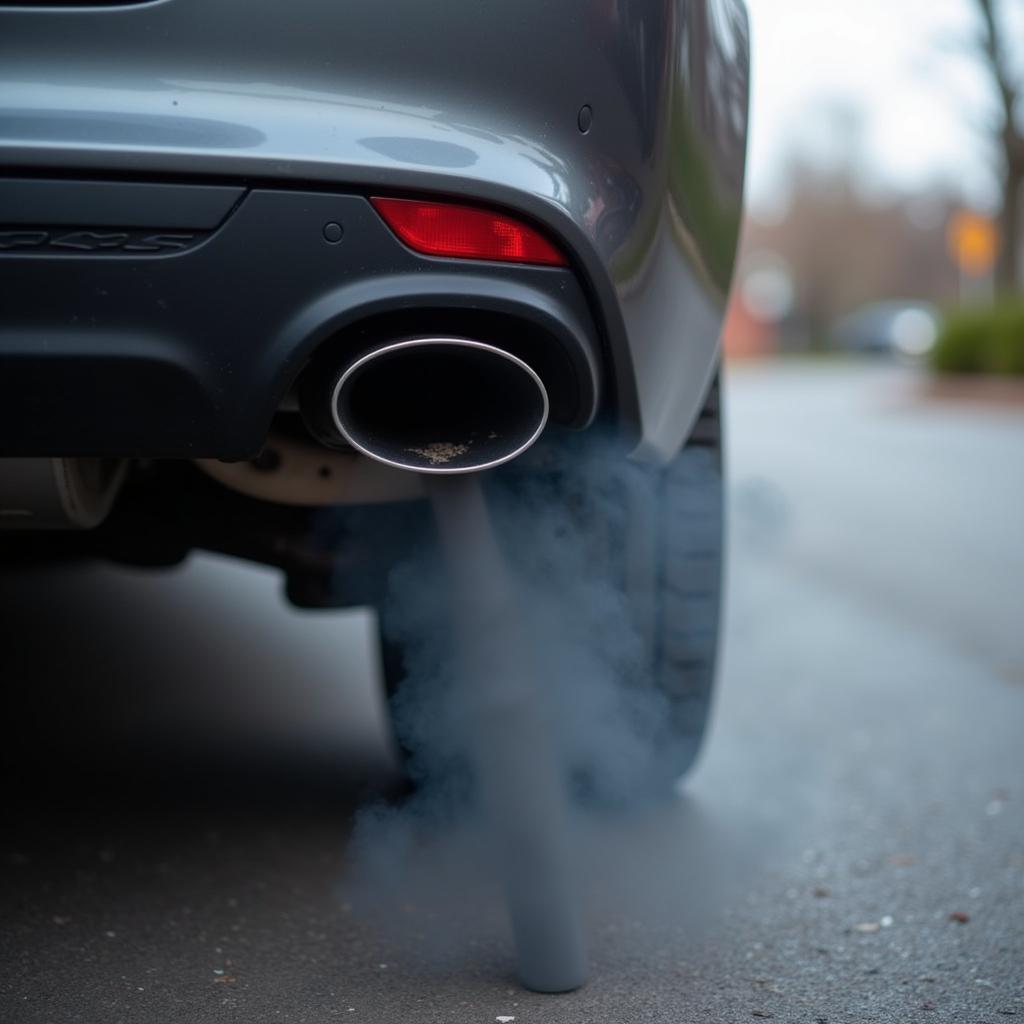Black smoke billowing from your car’s exhaust is a clear sign that something’s not right. This problem not only indicates reduced engine efficiency and increased fuel consumption but also points to potential environmental harm. Understanding the root causes of this issue is crucial for effective troubleshooting and repair.
Similar to car carburetor problem symptoms, black smoke often indicates underlying engine issues. This article will delve into the various causes of black smoke, provide diagnostic tips, and offer practical solutions for fixing the “Car Black Smoke Problem.” Whether you’re a car owner, a mechanic, or an automotive enthusiast, this comprehensive guide will equip you with the knowledge to address this common issue effectively.
Understanding the Causes of Black Smoke
Black smoke from the exhaust is primarily caused by incomplete combustion of fuel. This means that the fuel isn’t burning entirely, resulting in soot particles being expelled through the exhaust system. Several factors contribute to this incomplete combustion:
-
Faulty Fuel Injectors: Malfunctioning injectors can deliver too much fuel into the combustion chamber, leading to an overly rich air-fuel mixture. This excessive fuel cannot be completely burned, resulting in black smoke.
-
Clogged Air Filter: A restricted air filter reduces the amount of air reaching the engine. This imbalance in the air-fuel mixture causes incomplete combustion and subsequent black smoke emission.
-
Malfunctioning MAF Sensor: The Mass Airflow (MAF) sensor measures the amount of air entering the engine. A faulty sensor can provide inaccurate readings, leading to an incorrect air-fuel mixture and black smoke.
-
Faulty Engine Control Unit (ECU): The ECU is the brain of the engine management system. If the ECU malfunctions, it can send incorrect signals to the fuel injectors, causing an overly rich mixture and black smoke.
 Black Smoke from Exhaust Pipe of a Diesel Car
Black Smoke from Exhaust Pipe of a Diesel Car
Diagnosing the Problem
Diagnosing the “car black smoke problem” requires a systematic approach:
-
Visual Inspection: Start by visually inspecting the air filter for clogging and checking for any obvious leaks in the fuel system.
-
Check Engine Light: Is the check engine light illuminated? If so, use an OBD-II scanner to retrieve the diagnostic trouble codes (DTCs). These codes can pinpoint the source of the problem.
-
Exhaust Gas Analysis: An exhaust gas analyzer can measure the composition of the exhaust gases, providing valuable insights into the combustion process. High levels of hydrocarbons and carbon monoxide indicate incomplete combustion.
-
Fuel Pressure Test: Check the fuel pressure to ensure it’s within the manufacturer’s specifications. High fuel pressure can lead to an overly rich mixture.
Solutions and Preventive Measures
Once you’ve diagnosed the cause of the black smoke, you can implement the appropriate solution:
-
Replace Faulty Components: Replace any faulty components such as fuel injectors, MAF sensor, or a clogged air filter. This might also entail repairing or replacing a damaged ECU.
-
Clean the Fuel System: A professional fuel system cleaning can remove deposits and contaminants that may be contributing to the problem. This can also involve cleaning the intake manifold and throttle body.
-
Regular Maintenance: Adhering to a regular maintenance schedule, including timely oil changes, filter replacements, and spark plug replacements, can prevent many issues that lead to black smoke.
Just like you can learn how to diagnose a car engine problem, understanding the nuances of black smoke can empower you to address the issue effectively. Preventative measures, like regular maintenance and timely repairs, are essential for long-term engine health.
Addressing Specific Scenarios: Diesel Engines
Diesel engines are more prone to black smoke, especially under heavy load or acceleration. For diesel engines, additional causes for black smoke could include:
-
Faulty Fuel Injector Pump: A malfunctioning fuel injector pump can deliver excessive fuel, causing black smoke.
-
Clogged Diesel Particulate Filter (DPF): The DPF traps soot particles. A clogged DPF restricts exhaust flow and can lead to increased black smoke.
video car problem smoke effect provides a visual representation of how different engine problems can manifest as smoke effects, further enhancing your understanding of this issue.
Expert Insights
John Smith, a seasoned automotive engineer with over 20 years of experience, emphasizes the importance of timely diagnosis. He states, “Addressing the black smoke issue promptly can prevent further damage to the engine and catalytic converter.” Another expert, Maria Garcia, a certified mechanic specializing in engine diagnostics, adds, “Regular maintenance and using quality fuel are crucial for preventing black smoke and ensuring optimal engine performance.” Furthermore, David Lee, an automotive consultant, advises, “Ignoring black smoke can lead to costly repairs down the line, so it’s best to address the issue proactively.”
Conclusion
The “car black smoke problem” is a common issue with various underlying causes. By understanding these causes and following the diagnostic steps outlined in this article, you can effectively troubleshoot and fix the problem. Remember, regular maintenance is key to preventing black smoke and maintaining a healthy engine. Similar to understanding symptoms of engine problems in cars and signs of car engine problems, recognizing and addressing black smoke is crucial for maintaining your vehicle’s health. For any assistance or further inquiries, feel free to connect with AutoTipPro at +1 (641) 206-8880. Our office is located at 500 N St Mary’s St, San Antonio, TX 78205, United States.





Leave a Reply